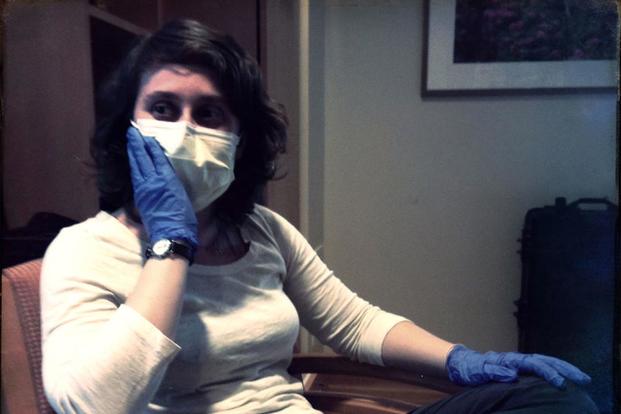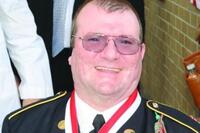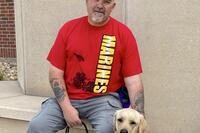This article originally appeared on TheWarHorse.org, a nonprofit investigative news organization focused on covering the Departments of Defense and Veterans Affairs.
Molly Pearl is a social worker and veteran spouse/caregiver. She is passionate about economic justice, dis/ability, and exploring the space between science fiction and reality. She resides in Brooklyn with her husband and cats.
-- The art of war is of vital importance to the State. It is a matter of life and death, a road either to safety or to ruin. ... [It] is governed by five constant factors ... The Moral Law; Heaven; Earth; The Commander; Method and Discipline. -- Sun Tzu, The Art of War
When he learned he had cancer, my husband said two things: First, "I wish I had died in Afghanistan," and then, "I should have been better to you." He sits on the edge of a hospital bed, his hunched shoulders swaddled in an oversized medical gown.
I am lost between his first statement and everything that follows. My heart does not race. I do not panic. Instead, I ease into myself, breathing deep against countless years of holding it in. He speaks truth, and I see us then, two unwilling participants in a hastily brokered peace deal, enticed by relief of duty and a promise to lay down arms. It occurs to me that this is the closest he will ever come to apologizing. I lean forward and he falls into me, his weight crumpling into my chest, sobs wracking his body. This is how we make the imperceptible shift between soldier and patient, wife and caregiver.
The resident on call at the emergency room is named Dr. Goud.* He is a distractingly attractive South Asian man with a tattoo of a snake that peeks out from the cuff of his scrubs. He is young. Young enough that in another life, under different circumstances, we might have exchanged goodbyes at college graduation, him leaving for medical school and us for the Army.
It is clear that Dr. Goud does not want to be responsible for saying that my husband has cancer. Instead, he explains white blood cell counts and symptom clusters. Yes, it could be cancer. It could also be an infection, not unlike those seen in AIDS patients. The pattern of the lymphocytes will determine this, but he must consult a pathologist first. He leaves and my husband Googles "white blood cells high count" on his phone.
Another doctor arrives to take blood and administer painkillers. He has my husband bend over, pokes a suspicious red patch on his buttocks, and declares it an abscess. Each person enters quickly and leaves just as fast, gingerly closing the curtains that envelope us in a corner of the ER. I am sure that the room has grown quieter since we arrived.
Some hours in, the attending pathologist arrives. She wears her authority in her stern expression and white lab coat. Directives flow from her mouth, what we must do and how we should prepare. I cannot digest the message, though my stomach twists against its own emptiness. What about a viral infection? I remind her. It is cancer, she says. Definitely acute, probably lymphoblastic, she adds, as if the details lessen the absurdity of the moment. She may as well have handed me orders.
1. The Moral Law causes the people to be in complete accord with their ruler, so that they will follow him regardless of their lives, undismayed by any danger.
My college years introduced me to critical analysis and Marxist theory, cementing my disdain for the economic disparity that a prestigious education, and its cost, only deepened for me. I protested the war in Iraq. I occupied school buildings and agitated for trade unions. I exhibited a severe distrust for authority. My boyfriend shared these sentiments, despite being an ROTC student. What began as a chance encounter at a party turned into a date, then a dinner, and grew into an exchange of books and ideals. In dorm rooms with dimmed lights, we debated the ethical implications of using microloans to rebuild conflict-torn nations. His conviction endeared me to him. But what I debated, he lived. I did not yet understand the desperation born of obligation -- that he had signed and dated in ink.
My education followed a slower path. I held no romantic notions about being a military spouse, no intentions to become a mechanism in the system I loathed. Only love breeds such contradictions. Those first years, I willfully avoided my duties, first finishing school and then choosing to pursue a career in teaching far away from the military base. Still, I mailed carefully curated packages to Afghanistan, a carton of Marlboro Menthols tucked between magazine pages. I listened too closely to breaking news. I wished on every fallen eyelash and every heads-up penny. Mostly, I waited.
But the military is a jealous lover, and war its most expedient tool. On a bright afternoon while I sat grading papers, my phone rang with the familiar jumble of numbers that began with +93. My husband's voice sounded tinny against the thin signal, but I could hear the desperation in his words. He was supposed to be coming home soon, and he wanted me to know that his nightmares and shaking hands were already verging on a diagnosis. He didn't want to leave. He was not finished, and he was planning on staying. He had put his name in for a voluntary extension, seeking another six months, and told me only after he'd done so. I could not comprehend what answers he would find, what they were worth in exchange for our lives together. We did not end up debating it. Command rejected him outright.
Not quite a year before, we had lain on the floor in my room holding each other gently and speaking about the future. What will we do if you are hurt? I had asked. I don't remember how he answered, only that he grew quiet and still at the implication. So when he called, I came, leaving behind career and comfort to claim my role.
2. Heaven signifies night and day, cold and heat, times and seasons.
Trauma flattens time. I do not remember many details of the life we led after deployment. The persistent sense of waiting remained and grew to be as unbearable as the Louisiana heat. The state's entire seasonal cycle was drawn out like an endless New York summer, a perpetual fighting season. I watched as my husband's emotions flattened in accordance, measured only by degree of anger. A sink full of dishes might elicit a five-minute slew of obscenities. A trip to the grocery store merited an hour of sharp silence. A misunderstanding among friends meant we should cancel our weekend plans in New Orleans.
In those days, I begged him to open up, to fill the hole within me that I had carved away over months of separation. He obliged, recalling in a steady tone how the sun would set behind the jagged edges of a mountain, the purple stain of twilight bleeding across the qalats. He picked the label off a bottle of Abita and told me about helicopters. About guns and knives and the sweet, soft-shell crab smell that accompanies burnt bodies. And as he filled me to the brim, I consented, shouldering the weight of a life not lived, but one that must be carried.
3. Earth comprises distances, great and small; danger and security; open ground and narrow passes; the chances of life and death.
Our therapist accuses me of having far too much patience. The truth is that I like to play the long game. It is not that I did not understand how service and deployment would change us. No, I willfully stared into the distance, relying on the inevitability of movement that I only understood as forward. Hundred-meter targets, my husband would say, and I would smile and crack a joke. Here's the actual truth: I could never be with someone I can't argue with.
Our 400-meter target was New York -- home. Back there, far north of the swamps and valleys we never staked claims on, we expected to discover everything where we'd left it. Friends with their noses buried in books, huddled in the smokers' corner, clinging to each other's alcohol-warmed bodies. All time travelers have learned this fallacy of hope. With high hopes, we settled in a Brooklyn apartment where the circuit breaker tripped every time we ran the air conditioner while using the microwave. We had a roommate to split the rent with. We had new dress clothes and a history to build on. We would make it work. I went back to school; a prearranged agreement that, this time, my career would take precedence.
Six months elapsed before the war found us. It first arrived in the form of a rejected application for unemployment benefits. It came at night, in vivid terrors, and more troublingly during the days, which were marked by tense exchanges, or silence. It gained definition in a disability rating from the VA. And then, when the war had eaten through his bones and regenerated itself a thousand times over, the cells multiplying beyond comprehension, it came in the form of a diagnosis.
4. The Commander stands for the virtues of wisdom, sincerity, benevolence, courage and strictness.
The paperwork says his lymphocytes are 99 percent cancerous. As they prepare to transfer us from the ER to the ICU, the nurse comes to place an IV. She seems to pause, surveying our circumstances. I do not know what she sees, what prompts her words or how we are being committed to her memories. But she leaves with a gentle statement, You did the right thing, coming to the hospital. We thought he had the flu, but he had no health insurance, so I had assured him we could simply walk into the ER at the VA for a checkup. I do not know how to tell the nurse that choices don't exist in this place.
Being admitted means giving up freedom, even to walk unaccompanied to the elevator and arrive at your single-occupancy critical care room, its sliding glass doors angled into the hallway to ensure observation. So we wait dutifully for the transport and arrive via wheelchair. Proper lifting technique is applied. A new gown issued. Samples taken, IV bags hooked up. The monitors begin their gentle beeping, a single sound that will grow into a cacophony over the next year. A proposed chemotherapy schedule is taped to the whiteboard below a welcome message: Today is February 2nd, 2014. Your nurse is Yvette.
We don't look at each other as we survey our new surroundings, he from the bed, me from the plastic-coated armchair. If I lean back, a footrest emerges, suggesting the slightest comfort for a sleepless night. I do not intend to stay. Somewhere in the past, five years or five hours before, leaving meant something else. Something I lacked the courage to do. But here, in the middle of our war, I know what to do. I announce my departure, gather my things, and kiss my husband goodnight. I can still see his face, the gutted expression, his helplessness pushing into the spaces I'd cultivated years before. I do not forgive myself for leaving. I think of all the times he's left and wonder if he ever forgave himself for those.
5. By method and discipline are to be understood the marshaling of the army in its proper subdivisions, the graduations of rank among the officers, the maintenance of roads by which supplies may reach the army, and the control of military expenditure.
I step out into the funnel of icy wind on 23rd Street and balance a cigarette on my cracked lips, cupping my hands around the end and inserting the lighter to protect the flame. It is a field-tested method, just like my husband taught me. I find my phone and call my mother. It is dark out, and I have no concept of where I am between dusk and dawn. I call again. On the third try, she wakes and her sleep-croaked voice calls out, familiar and comforting, What's wrong?! I tell her, folding into the space I know is there, carved out by the pain of my birth, that she always holds for me.
Over the phone, I hear her get up from the bed, my father's half-sleeping questions and her curt reply. She is moving. I hear the creak of the stairs and a rustling, and I know she is reaching for her nursing textbooks, flipping through pages to check blood results and hypothesize prognoses. Are they sure it isn't viral? she asks. Yes, I say. The white blood cell count is over 100,000. It is cancer.
I must move too. I chain-smoke my way down First Avenue, my exposed right hand an icy burn, my boots soaking up melting snow. It's nine blocks, down the stairs, and into the echo of the subway station. A train arrives and I sit, eyes straining against the unnatural fluorescent lights. My comrades and I stare into the darkness of the tunnel, avoiding each other's presence in that way only New Yorkers can, the way I am always grateful for. We speed under the East River toward Brooklyn, to my apartment where the cat hasn't been fed since morning. Toward the Social Security office, Medicaid forms, the packing and moving and planning that I know must be done. Not out of obligation, or choice, but love.
*Editor's Note: Dr. Goud is a pseudonym.
-- The opinions expressed in this op-ed are those of the author and do not necessarily reflect the views of Military.com. If you would like to submit your own commentary, please send your article to opinions@military.com for consideration.















